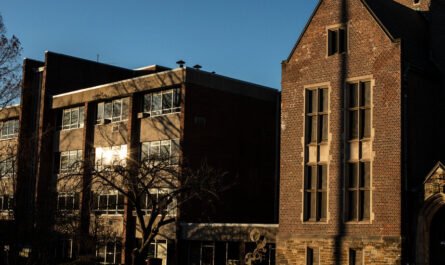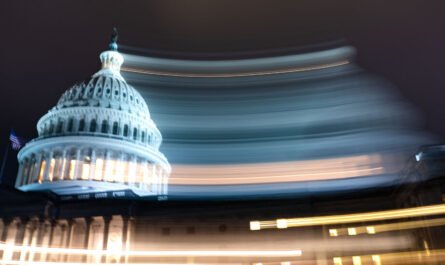Hunter Biden’s daughter Naomi Biden Neal took the stand on Friday in hopes of taking her father’s defense into her own hands. By the time she embraced him at the defendant’s table after an hour of emotionally raw testimony, it was unclear whether she helped or harmed his cause.
Ms. Biden Neal, 30, told the court her father seemed “hopeful” and sober weeks before he claimed to be drug-free on a gun application at the heart of the government’s case. But that upbeat assessment was quickly undercut by prosecutors, who introduced anguished texts from that period in which she told her father he had driven her to the breaking point.
“I’m really sorry, dad, I can’t take this,” Ms. Biden Neal wrote in October 2018, after he had failed to respond to several of her messages when they were both in New York.
“I don’t know what to say, I just miss you so much,” she said. I just want to hang out with you.”
The dramatic testimony by Ms. Biden Neal — somber, clad in black and nagged by a nervous cough — capped the first week of Mr. Biden’s trial on charges that he falsely claimed to be sober on an application to buy a handgun on Oct. 12 in Delaware.
The government’s goal is to prove Mr. Biden was using drugs regularly in 2018 and 2019 and knowingly falsified the form. His lawyers have offered a spirited, if narrower, defense centered on questioning whether Mr. Biden was actually using drugs in October 2018 and challenging the recollection of the prosecution’s witnesses.
Over the previous few days, David C. Weiss, the special counsel in the case, summoned three women with painful, intimate experiences with Mr. Biden’s descent into crack and alcohol after the 2015 death of his brother: his former wife, Kathleen Buhle; a onetime girlfriend, Zoe Kestan; and Hallie Biden, the widow of his brother, Beau Biden, with whom he had an ill-fated romantic relationship.
Ms. Biden Neal has been the only woman called by the defense, led by the veteran defense lawyer Abbe Lowell.
Ms. Biden Neal, who works as a lawyer in Washington, had been eager to help out her father, who she believes is the target of a politically motivated prosecution, according to people familiar with the situation. Even if things had gone more smoothly, she could offer only limited insights into the actions of Mr. Biden, who was often absent from her life for months and erratic even when they were in the same city.
Mr. Lowell guided her through a series of gentle questions during a direct examination that lasted 11 minutes as she sought to bolster the defense’s contention that her father was working hard to kick his addiction to crack cocaine and alcohol in the weeks leading up to his gun purchase.
After having lunch with him in Los Angeles in August 2018, Ms. Biden Neal concluded that he was “the clearest” she had seen him since her uncle’s death three years earlier, she told the court.
“He seemed great; he seemed hopeful,” she recalled.
But under an intense cross-examination, her claim seemed to crumble.
Just three months later, in mid-October 2018, Mr. Biden visited New York City, where his daughter was entering her second year of law school and moving in with her boyfriend.
The government produced several text exchanges that suggested he was not in a good place.
Mr. Biden ignored Ms. Biden Neal’s desperate texts for hours and made a bizarre request when he did resurface, around 2 a.m. “Are you up? Please call me,” he wrote to his daughter. He wanted her boyfriend to bring him his truck, which the couple had borrowed, to Midtown Manhattan from Brooklyn.
Later that day, Ms. Biden Neal and her father exchanged more texts, trying to arrange handing off the keys. She had hoped to see him, but that was looking unlikely.
“So no c u!?” she texted him on Oct. 18, adding a sad-face emoji.
Mr. Biden responded, “I’m sorry, I have been so unreachable, it’s not fair to you.”
They did see each other the next day. But she later admitted their encounters were often fleeting, lasting no more than an hour or two.
Ms. Biden Neal was subdued as she sat in the witness box, glumly reading a sheaf of her texts printed out by the prosecution. She said she did “not recall” sending them when asked to explain her state of mind, noting that her main recollection of those days was how difficult it was for the two of them to connect.
Her father appeared to be fighting tears as she spoke.
After stepping down from the stand, Ms. Biden Neal walked over to her father, who was sitting at the defense table, and embraced him before they exited the courtroom together.
The prosecution, which rested on Friday morning, has gone to great length — through witness testimony, hundreds of contemporaneous text messages and bank records, as well as the defendant’s own words — to illustrate that Mr. Biden spiraled through an unrelenting addiction to crack cocaine in the months before and after October 2018.
Over the course of the week, Mr. Lowell has established that no one saw Mr. Biden doing crack cocaine in October 2018, the month he bought the gun. Ms. Biden Neal’s testimony on Friday did not change that.
But two text messages retrieved from Mr. Biden’s phone have been hurting his defense from the start. One day after he purchased the gun, he sent a text saying he was meeting a dealer named Mookie. A day later, he followed up to say that he was sleeping on a car and smoking crack.
The apparent admission came to a head as Mr. Lowell questioned the prosecution’s last witness, Joshua Romig, a special agent with the Drug Enforcement Administration, who was asked to translate drug lingo introduced in the government’s case against Mr. Biden.
Mr. Lowell made the point that while the prosecution has spent days examining Mr. Biden’s communications earlier in 2018 and in 2019, showing pictures of him holding a crack pipe and texts about buying drugs, there was nothing comparable to show for October 2018.
“No reference of Chore Boy?” Mr. Lowell said to Mr. Romig. “No mention of a ball?”
Mr. Romig responded, “With the exception of the October text that we talked about, where he said he was smoking crack.”
The trial has served as a vivid reminder of a harrowing drama that has played out in the Biden family for years, underlined by the presence of friends and family of Mr. Biden’s in the courtroom every day. The first lady, Jill Biden, flew back from France on Thursday to retake her seat in the front row behind the defense counsel table on Friday.
The case centers on a fairly simple question: whether Mr. Biden lied on Oct. 12, 2018, when he marked “no” in answering a particular question on a federal gun application. It asked, “Are you an unlawful user of, or addicted to, marijuana or any depressant, stimulant, narcotic drug, or any other controlled substance?”
Mr. Biden is charged with three felonies: lying to a federally licensed gun dealer, making a false claim on the federal firearms application and possessing an illegally obtained gun. If convicted, he could face up to 25 years in prison and $750,000 in fines. But nonviolent first-time offenders who have not been accused of using the weapon in another crime rarely receive serious prison time for the charges.
It was unclear on Friday how many more witnesses, if any, the defense planned to call on Monday.




